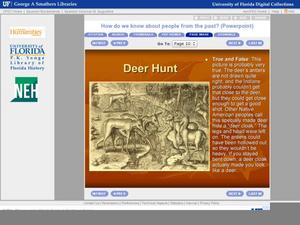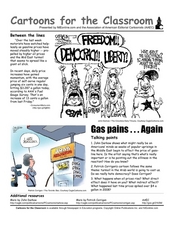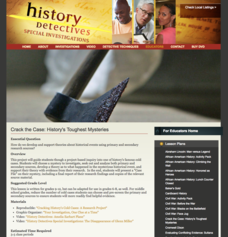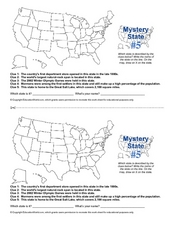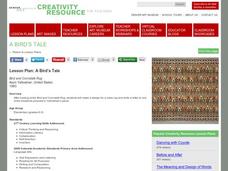Curated OER
House and Holmes: A Guide to Deductive and Inductive Reasoning
Test your pupils' reasoning skills with several activities and a quick mystery to solve. Learners watch and analyze a few video clips that demonstrate reasoning in action, practice deduction with an interactive and collaborative...
Curated OER
How Do We Know About People From The Past?
It's not enough to see or just read a primary source document; one has to analyze them fully to understand their historical implications. First learners are introduced to what primary and secondary sources are, then they read a bit of...
Curated OER
Who am I? - Egyptian Contributions
Each of the three questions on this worksheet include a clue to the answer. Seventh graders will read a each clue, tell what or who the clue was referring to, and then provide evidence from their readings. This is a great way to build...
Curated OER
Critical Thinking Strategies
Teach your readers to be critical thinkers. A strategy is outlined that can be used to compare and contrast entities. An example lists four states. The learner removes one state that "does not belong" in the list for some reason, and...
Minnesota Literacy Council
Introduction to Historical Thinking
Christopher Columbus: hero or villain? Prepare class members for the debate with activities that asks them to think critically about how history is reported.
Scouts
The Deadly Picnic: A Lab on Deductive Reasoning
Whodunnit? Find out who killed Mr. Brooks through a logical examination of evidence. Class members fill out a couple of data tables to help them pin down the suspect. After they've figured out just who the culprit is, pupils compose...
Curated OER
Cartoons for the Classroom: You've Got Mail!
As the U.S. Postal System adjusts to virtual messaging, will snail mail slowly fade away? Examine the current phenomenon with your class through this political cartoon analysis, which has background information to give context for 2...
Curated OER
Thinking About Hate
This lesson starts out with a guided discussion about the statement "Birds fly in the sky; airplanes fly in the sky; therefore, airplanes are birds" and goes on to cover logical fallacies and reliable sources, relating these to the topic...
Curated OER
Cartoons in the Classroom: Gas Pains Again
The price of gas has increased around the country, and many political cartoons, such as this one, have used humor to get people thinking about it. With the help of three very good critical thinking prompts, learners will analyze a...
iCivics
So You Think You Can Argue
What defines an argument, and how can someone properly formulate a counterargument? This resource provides two options—an interactive PowerPoint presentation or worksheet—that will support your learners as they begin to explore how to...
Curated OER
The Economic Way of Thinking - About Everything
Students write their definitions of economics on index cards and revise them as the lesson continues. They discuss the principles of economic reasoning and after completing a quiz, use economic reasoning to solve "real life" mysteries.
PBS
Crack the Case: History's Toughest Mysteries
Young sleuths don their trench coats, tip their fedoras, and grab their notepads to investigate one of four famous unsolved mysteries. After examining multiple primary and secondary sources related to their cold case, they propose a...
Curated OER
Mystery State # 28
Using clues is a great way to increase deductive and logical reasoning skills. Boost thinking skills while quizzing kids about us geography. They use five clues to determine which state is in question.
Curated OER
By George, I Think We Have It: Bicentennial quarter reverse
Voting is one of the major reasons the US adopted public education. Educate your class populace, they will analyze the images on a bicentennial quarter and think about the contributions George Washington made to the United States. They...
Curated OER
Mystery State # 41
Kids use their deductive reasoning skills, state knowledge, and five clues to determine mystery state #41. They'll follow the clues to locate the mystery state on a US map. Note: This is a warm-up activity, so it includes two short...
Curated OER
Mystery State # 5
Mystery state number five is none other than Utah! Quiz your kids on state knowledge while building deductive reasoning skills. They use each of the five clues to determine the name of the mystery state. A great warm up when studying...
Curated OER
Geography A to Z: The Letter G
Using clues to answer questions is a way to increase deductive reasoning skills. Kids answer seven geography clues with answers all starting with the letter G. A great way to test world geography or warm up the class.
Curated OER
Lesson Plan: A Bird's Tale
Who wouldn't love to get a letter from a blue bird? Elementary art enthusiasts analyze the social and historical context of Ason Yellowhair's Navajo piece, Bird and Cornstalk Rug. They examine the construction and images on the rug...
Curated OER
The Brain Teaser Five Pack
In this critical thinking worksheet, learners explain in their own words the answers to 5 mentally challenging brain teasers asked on the worksheet.
Association of American Geographers
Project GeoSTART
Investigate the fascinating, yet terrifying phenomenon of hurricanes from the safety of your classroom using this earth science unit. Focusing on developing young scientists' spacial thinking skills, these lessons engage learners in...
Curated OER
Lesson: From Time to Time
A portrait The Radcliffe Family circa 1742 is inspiration for creative writing and empathetic reasoning. Your class discusses the period in which the piece was painted, then imagines what life was like for one of the people seen in the...
Curated OER
A Differentiated Way through Think Dots
Students examine reasons that led people to explore, identify "West" as defined following Revolutionary War, explain importance of finding natural resources, develop time line of dates and events leading up to Lewis and Clark Expedition,...
University of California
Equal Rights? The Women's Movement from Suffrage to Schlafly
If you've never heard of the Equal Rights Amendment, it's probably because there isn't one in the United States Constitution. Delve into the contentious history behind the ERA, its founders and supporters, and reasons for its political...
C-SPAN
Why Do Americans Not Vote in Elections?
In an age of inflamed politics, who votes, who doesn't vote, and why are the questions everyone is trying to answer. Pupils listen to scholars, journalists and data crunchers on voting statistics to make their own conclusions. A chart...



